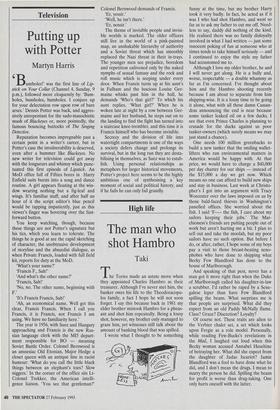Television
Putting up with Potter
Martyn Harris
Bumholes!' was the first line of Lip- stick on Your Collar (Channel 4, Sunday, 9 p.m.), followed more eloquently by: Sum- holes, bumholes, bumholes. I conjure up for your delectation row upon row of bare arses.' Dennis Potter was back, and aggres- sively unrepentant for the sado-masochistic mush of Blackeyes or, more pointedly, the famous bouncing buttocks of The Singing Detective.
Reputation becomes impregnable past a certain point in a writer's career, but in Potter's case the invulnerability is deserved, even after a bummer like Blackeyes. No new writer for television could get away with the longueurs and whimsy which punc- tuated this first episode of Lipstick. An MoD office full of Fifties bores in Harry Enfield suits bursts into a song and dance routine. A girl appears floating at the win- dow wearing nothing but a fig-leaf and wings. It's familiar stuff, and after half an hour of it the script editor's blue pencil would be tapping impatiently, just as this viewer's finger was hovering over the fast- forward button.
You keep watching, though, because these things are not Potter's signature but his tics, which you learn to tolerate. The things he is good at are the rapid sketching of character, the unobtrusive development of storyline and the absurdist dialogue, as when Private Francis, loaded with full field kit, reports for duty at the MoD.
`What's your name?'
`Francis F., Sah!'
`And what's the other name?'
`Francis, Sah!'
`No, no. The other name, beginning with F.'
`It's Francis Francis, Sah!'
`Ah, an economical name. Well get this clear, Francis Francis. When I call you Francis, it is Francis, not Francis I am using. We have no familiarity here.'
The year is 1956, with Suez and Hungary approaching and Francis is the new Rus- sian language clerk with the MI5 depart- ment responsible for BO — meaning Soviet Battle Order. Colonel Bernwood is an amnesiac Old Etonian, Major Hedge a closet queen with an antique line in racist humour: 'What do you call the little black things between an elephant's toes? Slow niggers.' In the corner of the office sits Lt- Colonel Trekker, the American intelli- gence liaison. 'You see that gentleman?' Colonel Bernwood demands of Francis.
`Er, yessir.'
`Well, he isn't there.'
`Er, nossir.'
The theme of invisible people and invisi- ble worlds is marked. The older officers still live in the world of a pink-painted map, an unshakable hierarchy of authority and a Soviet threat which has smoothly replaced the Nazi threat in their in-trays. The younger men see prejudice, boredom and repetition enlivened only by the naked nymphs of sexual fantasy and the rock and roll music which is seeping under every door. When Francis turns up at his aunt's in Fulham and the luscious Louise Ger- maine whisks past him in the hail, he demands 'Who's that girl?' To which his aunt replies, 'What girl?' When he is woken late at night by a row between Ger- maine and her husband, he steps out on to the landing to find the fight has turned into a staircase knee-trembler, and this time it is Francis himself who has become invisible.
Secrecy and the division of life into watertight compartments is one of the ways a society defers change and prolongs its survival, but in the long run they are desta- bilising in themselves, as Suez was to estab- lish. Using personal relationships as metaphors for larger historical movements, Potter's project here seems to be the highly ambitious one of synthesising a key moment of social and political history, and if he fails he can only fail grandly.


















































 Previous page
Previous page